Ncsbn lesson 6 - Study guides, Class notes & Summaries
Looking for the best study guides, study notes and summaries about Ncsbn lesson 6? On this page you'll find 26 study documents about Ncsbn lesson 6.
All 26 results
Sort by
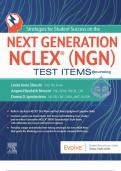 Popular
Popular
-
TEXT BOOK ON Strategies for Student Success To the NEXT GENERATION NCLEX(NGN) Test ITEMS-2023 by Linda A.Silvestri and Angela E. Silvestri(2023), NEWEST VERSION AND COMPLETE
- Other • 371 pages • 2024
-
- $24.49
- 3x sold
- + learn more
Strategies for student success on the next generation nclex | NEXT GENERATION NCLEX (NGN) TEST ITEMS 2023 YOU’VE JUST PURCHASED MORE THAN A TEXTBOOK! Enhance your learning with Evolve Student Resources. These online study tools and exercises can help deepen your understanding of textbook content so you can be more prepared for class, perform better on exams, and succeed in your course. Activate the complete learning experience that comes with each If your sch...
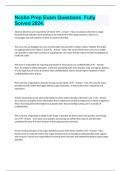
-
NCSBN Current Exams Study Guide Bundle Updated 2024!!
- Package deal • 16 items • 2024
-
- $25.99
- + learn more
1 Exam (elaborations) NCSBN Practice Questions With All Correct Answers 100% 2024. 2 Exam (elaborations) Ncsbn Prep Exam Questions Fully Solved 2024. 3 Exam (elaborations) NCSBN 5 Week Exam Questions With Correct Answers 2024. 4 Exam (elaborations) NCSBN - Lesson 6 Post Test Questions And Answers Graded A+ 2024.
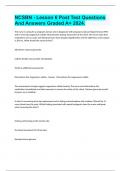
-
NCSBN - Lesson 6 Post Test Questions And Answers Graded A+ 2024.
- Exam (elaborations) • 12 pages • 2024
- Available in package deal
-
- $9.99
- + learn more
The nurse is caring for a pregnant woman who is diagnosed with pregnancy induced hypertension (PIH) and is receiving magnesium sulfate intravenously. During assessment of the client, the nurse notes that respirations are 12, pulse and blood pressure have dropped significantly, and the eight-hour urine output is 200 mL. What should the nurse do first? Administer calcium gluconate Call the health care provider immediately Perform additional assessments Discontinue the magnesium sul...
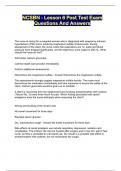
-
NCSBN - Lesson 6 Post Test Exam Questions And Answers
- Exam (elaborations) • 9 pages • 2023
- Available in package deal
-
- $9.99
- + learn more
NCSBN - Lesson 6 Post Test Exam Questions And Answers...
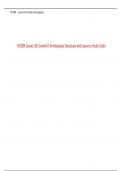
-
NCSBN Lesson 3B: Growth & Development Questions with Answers Study Guide,100% CORRECT
- Exam (elaborations) • 47 pages • 2023
- Available in package deal
-
- $15.49
- + learn more
NCSBN Lesson 3B: Growth & Development Questions with Answers Study Guide Piaget’s Theory of Cognitive Development Piaget's theory of cognitive development (first published in 1952) includes four distinct stages: sensorimotor, pre-operational, concrete operational and formal operational. All children move through these specific periods at different rates but in the same sequence. A child assimilates and accommodates knowledg...
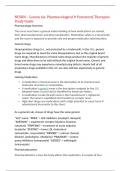
-
NCSBN – Lesson 6A: Pharmacological & Parenteral Therapies Study Guide,100% CORRECT
- Exam (elaborations) • 24 pages • 2023
-
- $14.99
- + learn more
NCSBN – Lesson 6A: Pharmacological & Parenteral Therapies Study Guide Pharmacology Overview The nurse must have a general understanding of how medications are named, their pharmacodynamics and pharmacokinetics. Medication safety is a top priority and the nurse is expected to provide safe and proper medication adminstration. Generic drugs Nonproprietary drugs (i.e., not protected by a trademark). In the U.S., generic drugs are required to meet the same bioequivalency test as the original br...
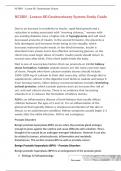
-
NCSBN –Lesson 8E: Genitourinary System Study Guide,100%CORRECT
- Exam (elaborations) • 53 pages • 2023
- Available in package deal
-
- $15.99
- + learn more
NCSBN –Lesson 8E:Genitourinary System Study Guide Due to an increase in sensitivity to insulin, rapid fetal growth and a reduction in eating associated with “morning sickness,” women with pre-existing diabetes have a higher risk of hypoglycemia and will need decreased amounts of insulin. In the second trimester, the placenta is fully developed and hormone levels being to rise steadily, which increases maternal insulin needs. In the third trimester, insulin is absorbed more slowly and is...
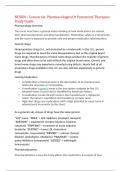
-
NCSBN – Lesson 6A: Pharmacological & Parenteral Therapies Study Guide,100% CORRECT
- Exam (elaborations) • 24 pages • 2023
-
- $15.59
- + learn more
NCSBN – Lesson 6A: Pharmacological & Parenteral Therapies Study Guide Pharmacology Overview The nurse must have a general understanding of how medications are named, their pharmacodynamics and pharmacokinetics. Medication safety is a top priority and the nurse is expected to provide safe and proper medication adminstration. Generic drugs Nonproprietary drugs (i.e., not protected by a trademark). In the U.S., generic drugs are required to meet the same bioequivalency test as the original br...
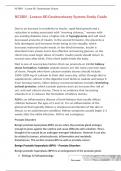
-
NCSBN –Lesson 8E:Genitourinary System Study Guide,100% CORRECT
- Exam (elaborations) • 53 pages • 2023
-
- $15.99
- + learn more
NCSBN –Lesson 8E:Genitourinary System Study Guide Due to an increase in sensitivity to insulin, rapid fetal growth and a reduction in eating associated with “morning sickness,” women with pre-existing diabetes have a higher risk of hypoglycemia and will need decreased amounts of insulin. In the second trimester, the placenta is fully developed and hormone levels being to rise steadily, which increases maternal insulin needs. In the third trimester, insulin is absorbed more slowly and is...
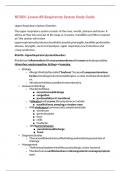
-
NCSBN–Lesson 8B:Respiratory System Study Guide,100% CORRECT
- Exam (elaborations) • 69 pages • 2023
- Available in package deal
-
- $16.49
- + learn more
NCSBN–Lesson 8B:Respiratory System Study Guide Upper Respiratory System Disorders The upper respiratory system consists of the nose, mouth, pharynx and larynx. It allows air flow into and out of the lungs as it warms, humidifies and filters inspired air.This section will review upperrespiratorydisorderssuchasrhinitis,sinusitis,pharyngitis,tonsillitis,peritonsillarabscess, laryngitis, vocal cord paralysis, upper respiratory tract infections and croup syndromes. Rhinitis–UpperRespiratoryS...

Study stress? For sellers on Stuvia, these are actually golden times. KA-CHING! Earn from your study resources too and start uploading now. Discover all about earning on Stuvia


